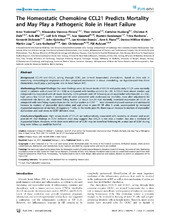| dc.contributor.author | Yndestad, Arne | en_US |
| dc.contributor.author | Finsen, Alexandra Vanessa | en_US |
| dc.contributor.author | Ueland, Thor | en_US |
| dc.contributor.author | Husberg, Cathrine | en_US |
| dc.contributor.author | Dahl, Christen P. | en_US |
| dc.contributor.author | Dickstein, Kenneth | en_US |
| dc.date.accessioned | 2013-04-02T13:34:35Z | |
| dc.date.available | 2013-04-02T13:34:35Z | |
| dc.date.issued | 2012-03-12 | eng |
| dc.Published | PLoS ONE 7(3): e33038 | eng |
| dc.identifier.issn | 1932-6203 | |
| dc.identifier.uri | https://hdl.handle.net/1956/6466 | |
| dc.description.abstract | Background: CCL19 and CCL21, acting through CCR7, are termed homeostatic chemokines. Based on their role in concerting immunological responses and their proposed involvement in tissue remodeling, we hypothesized that these chemokines could play a pathogenic role in heart failure (HF). Methodology/Principal Findings: Our main findings were: (i) Serum levels of CCL19 and particularly CCL21 were markedly raised in patients with chronic HF (n = 150) as compared with healthy controls (n = 20). A CCL21 level above median was independently associated with all-cause mortality. (ii) In patients with HF following acute myocardial infarction (MI; n = 232), high versus low CCL21 levels 1 month post-MI were associated with cardiovascular mortality, even after adjustment for established risk factors. (iii). Explanted failing human LV tissue (n = 29) had markedly increased expression of CCL21 as compared with non-failing myocardium (n = 5). (iv) Our studies in CCR7−/− mice showed improved survival and attenuated increase in markers of myocardial dysfunction and wall stress in post-MI HF after 1 week, accompanied by increased myocardial expression of markers of regulatory T cells. (v) Six weeks post-MI, there was an increase in markers of myocardial dysfunction and wall stress in CCR7 deficient mice. Conclusions/Significance: High serum levels of CCL21 are independently associated with mortality in chronic and acute post-MI HF. Our findings in CCR7 deficient mice may suggest that CCL21 is not only a marker, but also a mediator of myocardial failure. However, while short term inhibition of CCR7 may be beneficial following MI, a total lack of CCR7 during long-term follow-up could be harmful. | en_US |
| dc.language.iso | eng | eng |
| dc.publisher | Public Library of Science | eng |
| dc.rights | Attribution CC BY | eng |
| dc.rights.uri | http://creativecommons.org/licenses/by/2.5/ | eng |
| dc.title | The Homeostatic Chemokine CCL21 Predicts Mortality and May Play a Pathogenic Role in Heart Failure | en_US |
| dc.type | Peer reviewed | |
| dc.type | Journal article | |
| dc.description.version | publishedVersion | en_US |
| dc.rights.holder | Copyright 2012 Yndestad et al. | |
| dc.identifier.doi | https://doi.org/10.1371/journal.pone.0033038 | |
| dc.identifier.cristin | 949798 | |

